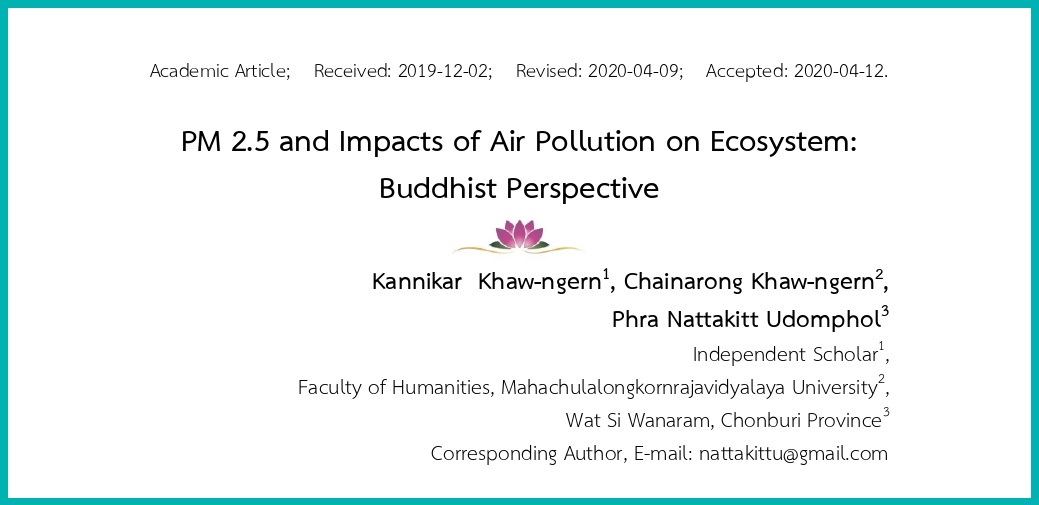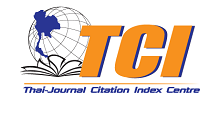PM 2.5 and Impacts of Air Pollution on Ecosystem: Buddhist Perspective
คำสำคัญ:
PM 2.5, Air Pollution, Ecosystem, Buddhist Ethicsบทคัดย่อ
The pollution of air with PM 2.5 has raised concerns about the negative impact of air quality on several health conditions, including respiratory illness, heart health, and allergic symptoms affecting the eyes and nasal passages. It is a growing concern for the general public in Thailand. Increasing levels of PM 2.5 in Thailand, it has impacted on the health and wellbeing of citizens, especially children. Exposure to high pollution levels affects children in irreversible ways. Children breathe faster than adults, which means that they are breathing in more polluted air than grownups. The younger they are, the more breaths per minute they take. In addition, their organs are still in a development stage, making them more vulnerable to immediate and life-long negative impacts. From a Buddhist perspective, an expression of craving, the very thing the Buddha pinpointed as the root cause of suffering. As signatories to this statement of Buddhist principles, the traditional five precepts, we acknowledge the urgent challenge of climate change we accept our individual and collective responsibility to do whatever we can to meet this target, including the personal and social responses outlined above. At the root of the ecological problem is a sense of self that needs to be deconstructed. We have a brief window of opportunity to take actions, to preserve humanity from imminent disaster and to assist the survival of the many diverse and beautiful forms of life on Earth.
Downloads
เอกสารอ้างอิง
Culp, J. (2019). Stay Safe in the PM 2.5. Bangkok: Chulalongkorn University.
Environment Protection Agency (EPA). (2018). Particulate Matter (PM) Pollution. Retrieved November 30, 2019, from https://www.epa.gov/pm-pollution/particulate-matter-pm-basics#PM
Loy, D. (2017). Eco-Dharma: Awakening to the Environmental Crisis. Retrieved November 30, 2019, from http://www.theinterfaithobserver.org/journal-articles/2017/8/15/a-new-nirvana-awakening-to-the-ecological-crisis
Loy, D. (2019). Ecodharma: Buddhist Teaching for the Ecological Crisis. London: Wisdom Publications.
NCC International Events (NCCIE). (2020). Ways to Protect Your Health from Unhealthy Air PM 2.5 in Bangkok. Retrieved January 30, 2020, from https://www.nccinternationalevents.Com/2020/01/24/ways-to-protect-your-health-from-unhealthy-air-pm2-5-in-bangkok/
Praiwan, P. M. (13 May 2019). A Clear Path to Cleaner Air? Retrieved November 30, 2019, from https://www.bangkokpost.com/thailand/general/1676592/a-clear-path-to-cleaner-air-
Reuters. (2018). Greenpeace Appeals to PM to Tackle Air Pollution Crisis. Retrieved November 30, 2019, from https://www.bangkokpost.com/thailand/general/1416442/greenpeace-appeals-to-pm-to-tackle-air-pollution-crisis
Schindell, D., et al. (2012). Simultaneously Mitigating Near-term Climate Change and Improving Human Health and Food Security. Science. 335 (6065), 183-189.
Stanek, L. W., et al. (2011). Attributing Health Effects to Apportioned Components and Sources of Particulate Matter: An Evaluation of Collective Results. Atmospheric Environment. 45, 5655–5663.
The Thaiger. (2020). Poor Air Quality in Bangkok and Northern Thailand Today. Retrieved January 30, 2020, from https://thethaiger.com/hot-news/air-pollution/poor-air-quality-in-bangkok-and-northern-thailand-today
World Health Organization (WHO). (2006). WHO Air Quality Guidelines for Particlate Matter, Ozone, Nitrogen Dioxcide and Sulfur Dioxide. Geneva: WHO Press.
World Health Organization (WHO). (2007). Health Relevance of Particulate Matter from Various Sources. Copenhagen: WHO Regional Office for Europe.
World Health Organization (WHO). (2013). Health Effects of Particulate Matter. Copenhagen: WHO Regional Office for Europe.
World Health Organization (WHO). (2018). Air Pollution. Retrieved November 30, 2019, from https://www.who.int/news-room/fact-sheets/detail/ambient-(outdoor)-air-quality-and-health
World Health Organization (WHO). (2019a). Fact Sheet 1: What is Air Pollution? Geneva: World Health Organization.
World Health Organization (WHO). (2019b). Fact Sheet 2: Preventing the Harmful Effects of Air Pollution. Geneva: World Health Organization.






